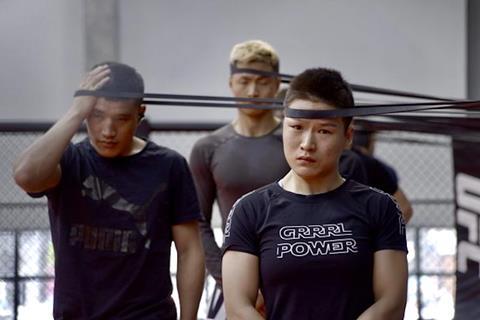FIRST IFF’s First Frame award winner profiles Chinese mixed martial artist Zhang Weili

Dir. Xu Huijing. China. 2024. 110mins
In 2019, Chinese mixed martial artist Zhang Weili became the first-ever Asian champion in the Ultimate Fighting Championship after defeating Jéssica Andrade in just 42 seconds. But it was Zhang’s successful strawweight title defence against Joanna Jędrzejczyk in 2020 which cemented her legendary status, as the fight is regarded by many pundits as the greatest in the history of women’s MMA. Sports stories are rarely more rousing.
Will please the fighter’s legion of fans
Yet rather than celebrate Zhang’s meteoric rise, Xu Huijing’s documentary covers her inevitable wobble. Indeed, Unstoppable plays like a fictional sports drama sequel wherein the onetime underdog faces setbacks that not only trigger self-doubt, but cause interpersonal conflicts amongst a close-knit team. Xu has been granted considerable access to the fighter at a critical stage of her career, but never truly delves into his subject’s motivation and mindset.
Unstoppable certainly lived up to its moniker at the FIRST International Film Festival (FIFF) where it won the First Frame award (a section dedicated to films by or about Chinese women). Xu has a strong track record with both sports subjects and at FIFF – his baseball documentary Tough Out received the festival’s documentary and audience awards in 2020. While Tough Out featured a local sports celebrity (the retired professional coach Zhang Jinxin) Unstoppable boasts a global superstar, so an international release may be on the cards. Still, it’s aimed squarely at MMA die-hards – unlike Yung Chang’s breakout boxing documentary China Heavyweight (2012) which found a receptive general audience by putting combat sport into the context of China’s ever-changing landscape.
The documentary starts in 2021 with Zhang traveling from Beijing to Jacksonville, Florida, where she will fight former champion Rose Namajunas. Zhang seems to be riding high, but there are signs of trouble in her increasingly frequent disagreements with head coach Cai Xuejun. When she loses to Namajunas after being knocked out in the first round, Zhang must deal with a flurry of online criticism and determine how to course correct. Most worryingly, the defeat saps her fighting spirit.
A change in training regimen seems to be the solution. Zhang and her team relocate to Arizona, where she works with former UFC champion Henry Cejudo whose “less is more” mantra runs against Cai’s insistence that Zhang needs to “scale up”. Zhang responds well to Cejudo’s program but still loses her rematch with Namajunas by split decision. Nonetheless, Zhang’s self-confidence has been restored, so she heads to Thailand to rigorously prepare for another bout with Jędrzejczyk.
Although the three fights afford the somewhat-overlong Unstoppable a robust three-act structure, the observational approach will grip viewers who are equipped with specialist knowledge while neophytes may struggle to go the distance. Despite focusing on Zhang’s punishing training as she strives to adjust her style while recovering from injuries, the documentary just provides a broad introduction to the range of MMA techniques and its subject’s signature talents (her nickname ’Magnum’ refers to her ferocious striking).
Aside from disagreement in Zhang’s camp about the merits of cardio and a clear illustration of the dangers of extreme weight-cutting methods, the film is heavy on rock music fuelled montages and light on detail. The same applies to the depiction of the business of MMA and Zhang’s accelerating celebrity. Xu touches on dealings with a promotions manager which have soured and how Zhang is impacted by online trolling before settling into a triumph over adversity narrative which will please the fighter’s legion of fans.
Perhaps wary of the level of pressure Zhang is under, Xu has a tendency to pull his punches. There is some detail about how far Zhang has come from her impoverished origins in Hebei province (her father is a retired miner and she toiled away in menial jobs after moving to Beijing at the age of 17). In addition to being an incredibly dedicated athlete, she’s also a genuinely humble individual who maintains an unshakable bond with her parents and is more upset by the death of her dog than the loss of her belt. There is much to admire about this down-to-earth star, but Xu fails to provide any sense of what pushes her forward.
In forgoing a wider framework, Xu also misses the opportunity to examine how Zhang’s fame in China has spurred productive conversations about the urban/rural divide and gender diversity. (This is particularly surprising considering that Tough Out was a socially-minded documentary which evoked Hoop Dreams (1994) by focusing on young athletes from disadvantaged backgrounds.) Through interviews and social media, Zhang has expressed the view that martial arts are a tool that can be applied to overcoming life’s obstacles while positioning herself as a representation of strength and resilience. In doing so, she has inspired women to practice combat sports for the purposes of fitness and self-defence. Sadly, these empowering aspects of her stardom are not explored here, with Zhang contained in a male-dominated environment where her voice isn’t always heard.
Production companies: Sunac Future Culture Film and Television Media, Wu Er San Graphic Culture
International sales: Sunac Pictures, Cao Zijian
Producers: Lyu Bo, Cao Zijian, Li Meng
Cinematography: Wei Kai, Zou Yue, Long Yingxian, Jian Runxin, Houpeng Yuxuan, Liu Yuanchen, Zhiao Jianguo
Editing: Xu Huijing





















